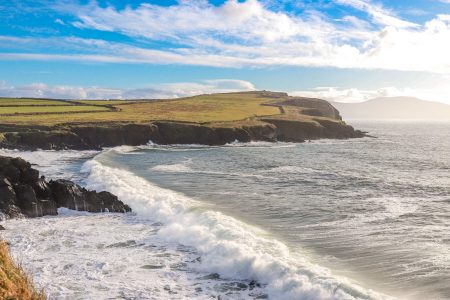March 7th 2023
New measures for the Marine Strategy Framework Directive are welcome and needed if we are to achieve Good Environmental Status in all descriptors. It is therefore disappointing to see that some new measures are vague, non-committal and are inadequate for reaching Good Environmental Status.
 ©Grainne Toomey
©Grainne Toomey
The IWT welcomes many of the new measures in the updated Programme of Measures (PoM) for the Marine Strategy Framework Directive (MSFD). The MSFD is an EU directive that aims to achieve Good Environmental Status (GES) in 11 different marine indicators. The plan was to achieve this goal by 2020 for EU waters, but that target was not met and so a new Programme of Measures must be undertaken to hit these goals. There were 12 new measures added to the PoM, 4 measures which existed but were not mentioned in the last report and 28 measures modified. Ireland failed to achieve full GES for 6 of the 11 descriptors in the MSFD.
The IWT highlighted in the last public consultation that new Marine Protected Area (MPA) legislation was of utmost importance, and this has made good progress since then. We also stated that site specific action plans were needed for current Natura 2000 sites and a legal review was taken of the current 15% disturbance threshold policy for activities within Special Areas of Conservation’s (SAC’s). This 15% threshold is applied in all risk assessments/appropriate assessments and is usually used to justify the continuance of a damaging activity as long as the activity disturbs less then 15% of the habitat. This has directly led to the deterioration of protected habitats (e.g. Roaringwater Bay).
The Common Fishery Policy (CFP) must also be implemented fully, and a transition to low impact fishing practices must begin while remote electronic monitoring devices should be on all vessels to record catches of target and non-target species. While we are happy to say some of these have been addressed, the full PoM falls short of what is required.
One of the measures in place since 2015 but not mentioned as it did not make the deadline for the report, is the support of the CFP by continuing to conduct research to ensure sustainable fisheries in Irish waters.
M228 states: Support Common Fisheries Policy in Ireland through Scientific Evidence and Advice. On an ongoing basis, continue to conduct research and produce scientific evidence and advice, both on a national basis and through work with ICES, in support of the CFP and related regulations to ensure sustainable fisheries in Irish waters and throughout the EU.
This obligation has not been fulfilled as it shows that only 18% of commercial fish stocks have achieved Good Environmental Status (GES), 22% have failed to achieve GES and for the remaining 60%, it is unknown what their environmental status is.
The national CFP Review Group reported in July 2022 and acknowledged that an ecosystem based approach is needed, taking into account socio-economic and conservation objectives while fishing at the maximum sustainable yield. It needs to be remembered that while taking into account socio-economic factors is extremely important, a more sustainable approach to fishing is the main objective. The measure in the PoM needs to be more specific and tackle the issue of phasing out indiscriminate and destructive fishing practices as well as having remote electronic monitoring systems onboard vessels so that catches and bycatch can be recorded correctly. This is essential to monitoring and enforcement so we can create appropriate conservation actions.
M229 states: Interactions Between Aquaculture & Fishing Activities and Natura 2000 Sites. Continue to investigate and manage the interactions between aquaculture and fishing activities and Natura 2000 sites and their qualifying interests (i.e. listed species/habitats); incorporating the development and use of scientific advisory products as they relate to appropriate licensing and management actions for such sites.
Managing Natura 2000 sites is something Ireland has consistently failed to do and while this measure has been in place since 2015, much more needs to be done. Assessing and updating the current 15% disturbance threshold policy in Natura 2000 sites should be specifically mentioned. This threshold is the reason many damaging activities still occur within sites, causing site deterioration and preventing conservation objectives being met. The proper implementation of the CFP policy is also a major factor in this.
For these PoMs to make a difference in GES of the indicators, full adherence to current EU and national directives and legislation is needed. Ireland has consistently failed to do this and we hope that with new MPA legislation coming into law this year, that a whole site, ecosystem-based approach is taken with the precautionary principle applied. Protected areas also need to undergo regular evaluation and have consistent management practices in place to ensure success. Only then can we hope for greater progress towards GES in many of the indicators.
Grace Carr